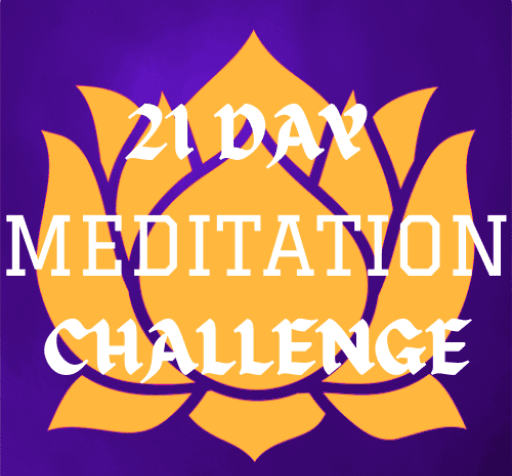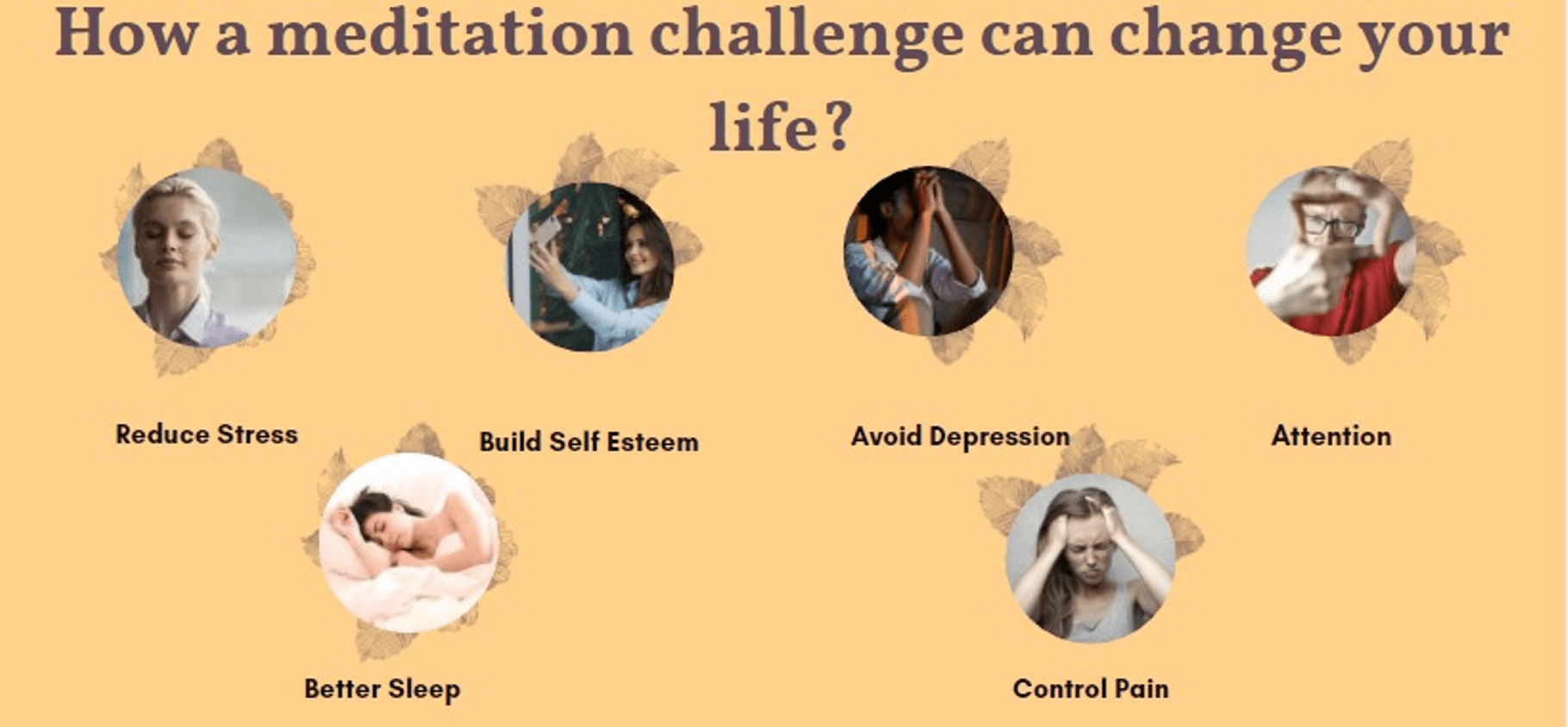In light of the recent events experienced by most people in our current world, from pressures that increased with the epidemic and quarantine, the practice of meditation has become a haven for many.
Hoping to get a little peace and stay away from the negative news spread. These two benefits are among the many benefits included in practicing meditation.
However, if you are a beginner or have not succeeded much in the continuous practice of meditation, the 21-day meditation challenge can really help you to build this habit and get more benefits on a mental, psychological, and even financial level.
Why 21-day meditation challenge?
The Meditation Challenge gives you a short, but continuous daily meditation experience. With the guidance, you need to set intentions and enter into meditation. All you have to do is sit back and follow the simple instructions.
Challenges help you stay active and interested in life. And you’ll start to feel the difference in yourself from the first week. Which motivates you to continue until the end of 21 days. Then, you will be eager to enter a new challenge.
21-day meditation challenge Benefits:
1. Reduce stress:
doctors and psychologists often recommend that you experiment with meditation when you’re struggling to cope with stress. When it comes to stress relief, many people think It is best to deal with your stress simply, and avoid the things that stress you out, and cause you physical and mental stress.
But sometimes the stress comes from our financial jobs or even our friends and family. You may not do avoid it. But by learning to meditate, you can greatly reduce stress without having to make any of these major changes to your lifestyle. But how can sitting in silence for 10 or 15 minutes It has a big impact on your life?
When we’re nervous about paying off a loan or giving a big presentation, our bodies release a hormone called Cortisol, which is responsible for many of the most common negative side effects, associated with stress.
Cortisol can impair your memory, increase your blood pressure, and disrupt your sleep. All of which can make you feel fatigued and unmotivated. Cortisol can also lead to depression and chronic anxiety, which can bring your productive lifestyle to a crashing halt.
Luckily, a 2013 study, found that meditation specifically mindfulness meditation effectively deals with stress by reducing the negative side effects of cortisol.
Another study examined more than 1,200 participants. In its results concluded that regular meditation reduces stress more than almost every medical condition, or psychological treatment on the market.
In both of these studies, the results were consistent for people of all ages and experience levels. So, no matter who you are or how much you know about meditation, it can be an incredibly effective way to reduce your stress.
2. build self-esteem
self-confidence is something that almost everyone struggles with Daily. In a world full of detractors, authoritarians, and negative people, it can be really hard to develop and maintain a lasting positive self-image, and without it, you might struggle every day just to avoid another period of depression.
Now, this sounds like mindfulness meditation can help you build a kind of self-esteem that won’t fall apart, the next time something doesn’t go your way.
Mindfulness meditation is actually a pretty simple concept to practice mindfulness. all you need to do is bring your complete attention Up to the present moment, by focusing exclusively on where you are and who you are.
Mindfulness can help you stay calm, relaxed and aware, and allows you to think clearly and rationally. The ultimate goal of mindfulness meditation is to connect you with your senses and emotions giving you a deeper understanding of yourself.
A 2005 study, showed that this deeper understanding often results in the development of self-esteem. Now, in this study researchers had a group of individuals diagnosed with breast cancer. Practice mindfulness meditation for 12 weeks.
At the start of the study, each participant was tested and showed very low levels of self-esteem. But after 12 weeks of meditation, the entire group showed dramatic improvements, despite their chronic illness.
While mindfulness meditation does help build self-esteem, it’s even more effective at stopping your self-esteem from decreasing, when you experience failure or social rejection, you might start having cyclical negative thoughts which can quickly destroy all of the self-esteem that you built up.
These harmful thoughts discourage you from doing the things that make you happy. So, it’s incredibly important to address them before they get out of control. Mindfulness meditation Challenge is a great way to do just that because it offers you the opportunity to bring your attention to the negative thoughts or habits and find ways to correct them
3. avoid depression
Meditation challenge also has been used as a form of therapy, for individuals struggling with depression. Not only does it reduce the production of chemicals in our brains associated with depression.
But meditation also fosters a more stable emotional mindset by decreasing the presence of unhealthy behaviors brooding, for example, is common amongst individuals with depression allowing for negative emotions like sadness, anger, and self-criticism.
To stick around for way too long, a study by the University of Exeter looked for this kind of behavior in two groups of people who were recovering from depression. The first group used only depression medication, while the second group practiced mindfulness meditation at least once every day.
The researchers found that about half of the medication group ended up relapsing because of unhealthy behaviors like brooding, which prevented the medication from doing its job. On the other hand, those who practice meditation were significantly less likely to relapse because they were less likely to engage in any of these depressive behaviors.
So, if you’re hoping to improve your emotional health, mindfulness meditation can be a safe and effective way to cut depression off at the source.
4. Increase attention
For most people, the hardest thing about meditation is keeping your mind from wandering. You’re so used to constantly thinking about your work and all your responsibilities. That it can be hard to focus on something simple like your breath or the present moment.
But by practicing this kind of concentration, you’re actually increasing your attention span. So, that you’ll be clear-headed and productive when you refocus your mind on work. But how much can meditation really affect your attention?
Well, in 2007, a study answered this question by testing the concentrated skills of people before and after an eight-week challenge on mindfulness meditation. The researchers found that meditation dramatically improved their speed and performance. Despite having never meditated before the eight-week challenge.
A number of other studies have shown the same overwhelmingly positive results. Suggesting that daily meditation can heighten your focus and increase your productivity.
5. Get better sleep:
How long does it take you to fall asleep at night? The number can vary, but generally, it should take between ten and twenty minutes. For your body to relax, shut down, and go to bed. So, what does it mean if it takes you an hour or more to fall asleep?
Well, it could mean you’re just going to bed too early. But difficulty falling asleep can also be a sign of insomnia. Believe it or not, over half the population has dealt with insomnia. Which can last anywhere, from a few days to a few years.
Most people would think to resolve the issue with sleeping pills. But these can have a number of nasty side effects, including addiction, and fatigue. So, psychologists have begun recommending meditation as a healthy and safe alternative.
By meditating before bed, you give your body and your mind the time to reduce stress and physically wind down. According to a 2015 study, this short period of relaxation can significantly improve the quality of your sleep.
Even for chronic insomniacs, it can help you fall asleep sooner, stay asleep longer, and stop you from randomly waking up in the middle of the night. Because you’re getting a better night’s sleep you’ll also notice improvements in memory concentration and problem-solving. which require your brain to be sharp and well-rested.
6. Control pain
The amount of pain that you feel is often based on your own perception. In other words, if you can learn to control your state of mind, you can often lessen the amount of pain.




